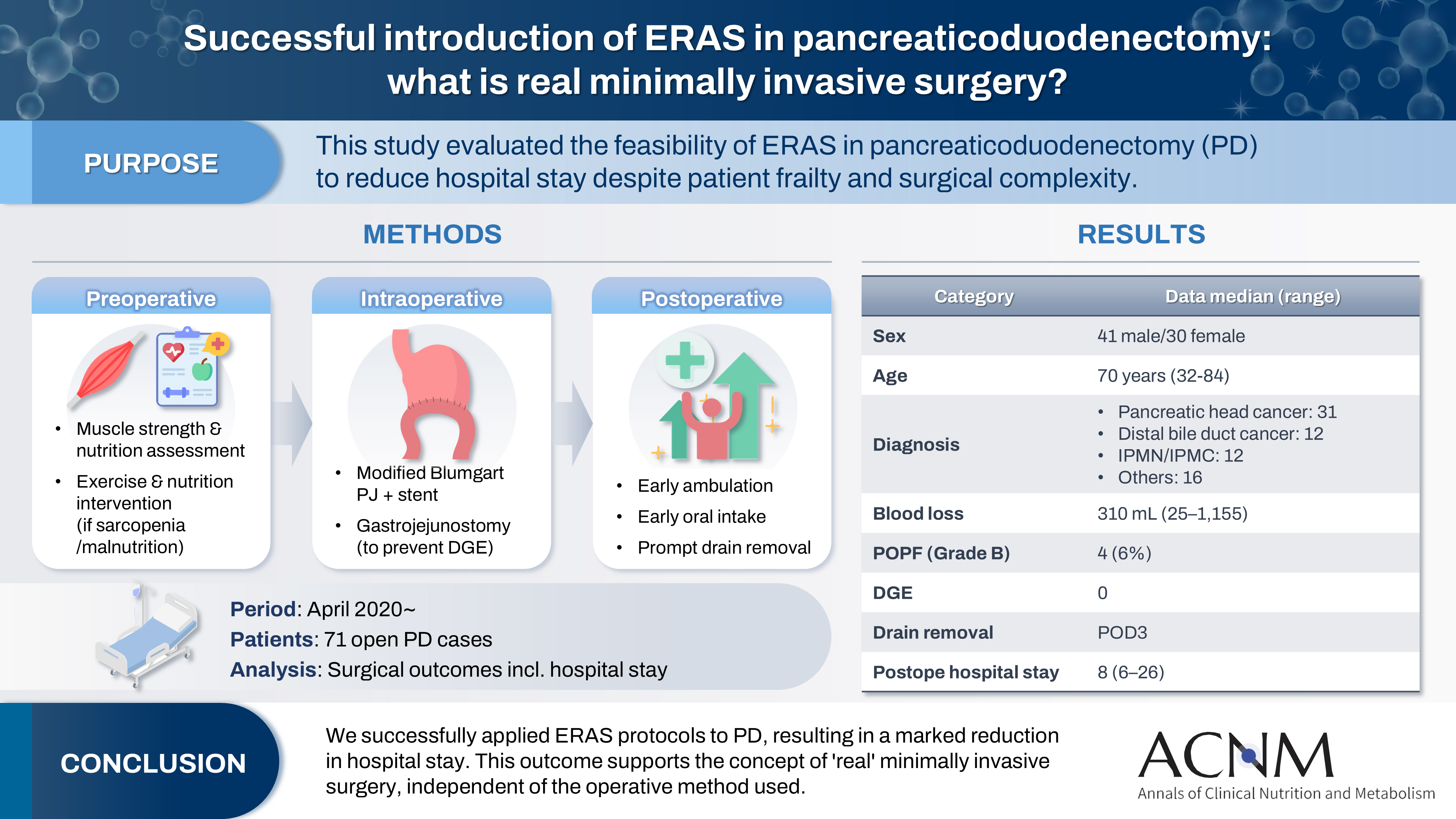Scopus, KCI, KoreaMed

Search
- Page Path
- HOME > Search
- Successful introduction of ERAS in pancreaticoduodenectomy: what is real minimally invasive surgery?
- Toshimi Kaido, Yosuke Miyachi, Koichiro Mitsuoka, Mariko Sambommatsu
- Ann Clin Nutr Metab 2025;17(2):156-161. Published online August 1, 2025
- DOI: https://doi.org/10.15747/ACNM.25.0014

-
 Graphical Abstract
Graphical Abstract
 Abstract
Abstract
 PDF
PDF 
- Purpose
The introduction of Enhanced Recovery After Surgery (ERAS) protocols for pancreaticoduodenectomy (PD) has been considered challenging due to factors such as preexisting malnutrition, sarcopenia, the complexity of the surgery, and the high incidence of postoperative complications, including postoperative pancreatic fistula (POPF) and delayed gastric emptying (DGE). This study aimed to determine whether ERAS could be implemented in PD to achieve shorter postoperative hospital stays.
Methods
Our novel approach consists of three components. Preoperatively, we routinely assess patients' muscle strength and nutritional status and initiate exercise and nutritional interventions for those identified with sarcopenia or malnutrition. Intraoperatively, we perform pancreaticojejunostomy using a modified Blumgart’s technique with our stent placement policy and utilize new gastrojejunostomy methods to prevent DGE. Principles of postoperative management are early ambulation, early oral intake, and early drain removal. Since April 2020, we have employed this strategy and retrospectively evaluated its effectiveness. We enrolled 71 consecutive patients who underwent open PD with curative intent. Various surgical outcomes, including postoperative hospital stay, were analyzed.
Results
There were 41 men and 30 women, with a median age of 70 years. Preoperative diagnoses included pancreatic head cancer in 31, distal bile duct cancer in 12, and others. Median intraoperative blood loss was 310 mL. Grade B POPF occurred in four patients (6%). No cases of DGE were observed. The median postoperative hospital stay was 8 days (range, 6–26 days).
Conclusion
We successfully implemented ERAS protocols in PD and achieved a significantly reduced postoperative hospital stay. We propose that this approach is “real minimally invasive surgery," regardless of the surgical technique used.
- 3,966 View
- 19 Download

- The Effects of Early Enteral Nutrition in Patients: A Role of Nutrition Support Team
- Kye Wol Park, Hee Ryoung Son, Ji Hoon Kim, Myoung Hee Kim, Eun Jin Choi
- J Clin Nutr 2016;8(2):66-70. Published online August 31, 2016
- DOI: https://doi.org/10.15747/jcn.2016.8.2.66
-
 Abstract
Abstract
 PDF
PDF Purpose:
The study examined the effects of early enteral nutrition on the patients’ length of stay in an intensive care unit (ICU), length of stay and mortality rate.
Methods:
A retrospective design was employed with a total of 461 patients (mean age=69.9±15.6 years; 253 males; 208 females). They were divided into two groups according to when they received enteral feeding: an “early enteral nutrition” (EEN) group of 148 patients (32.1%) who received enteral feeding within 48 hours of their arrival at the hospital and a “delayed enteral nutrition” (DEN) group of 313 patients (67.9%) who received enteral feeding at some point after 48 hours of their arrival at the hospital. The EEN group and control group were similar in terms of age, sex, body mass index, and underlying diseases.
Results:
The EEN group’s total length of stay in hospital was shorter (23.29±27.19 days) than that of the control group (36.74±32.24 days); the difference was significant (P<0.001). The EEN group also showed a shorter length of stay in the ICU (13.67±22.77 days) than the DEN group (17.46±21.02 days) and a lower mortality rate (17.6%) than the control group (18.8%), but these differences were not significant.
Conclusion:
The study found that early enteral nutrition treatment reduced total length of stay in hospital significantly. The findings suggest that early enteral nutrition treatment plays an important role in the patients’ recovery and prognosis.
-
Citations
Citations to this article as recorded by- Nutritional support for critically ill patients by the Korean Society for Parenteral and Enteral Nutrition — part I: a clinical practice guideline
Seung Hwan Lee, Jae Gil Lee, Min Kwan Kwon, Jiyeon Kim, Mina Kim, Jeongyun Park, Jee Young Lee, Ye Won Sung, Bomi Kim, Seong Eun Kim, Ji Yoon Cho, A Young Lim, In Gyu Kwon, Miyoung Choi
Annals of Clinical Nutrition and Metabolism.2024; 16(3): 89. CrossRef - The Status of Enteral Nutrition Formula Use by Dietitians in Hospitals Within Busan and Gyeongnam Area
Haejin Kang, Minji Woo, Eunju Park, Yoo Kyoung Park
Clinical Nutrition Research.2022; 11(1): 9. CrossRef - Physician Compliance with Nutrition Support Team Recommendations: Effects on the Outcome of Treatment for Critically Ill Patients
Hyon-Ju Yon, Eun-Suk Oh, Ji Young Jang, Ji Yun Jang, Hongjin Shim
Journal of Acute Care Surgery.2022; 12(1): 1. CrossRef - Health and Nutrition Status of Elderly People with Multimorbidity: A Korea National Health and Nutrition Examination Survey (2013~2015)
Na-Gyeong Oh, Jung-Sook Seo
Korean Journal of Community Nutrition.2020; 25(6): 502. CrossRef
- Nutritional support for critically ill patients by the Korean Society for Parenteral and Enteral Nutrition — part I: a clinical practice guideline
- 1,053 View
- 8 Download
- 4 Crossref


 E-submission
E-submission KSPEN
KSPEN KSSMN
KSSMN ASSMN
ASSMN JSSMN
JSSMN
 First
First Prev
Prev


